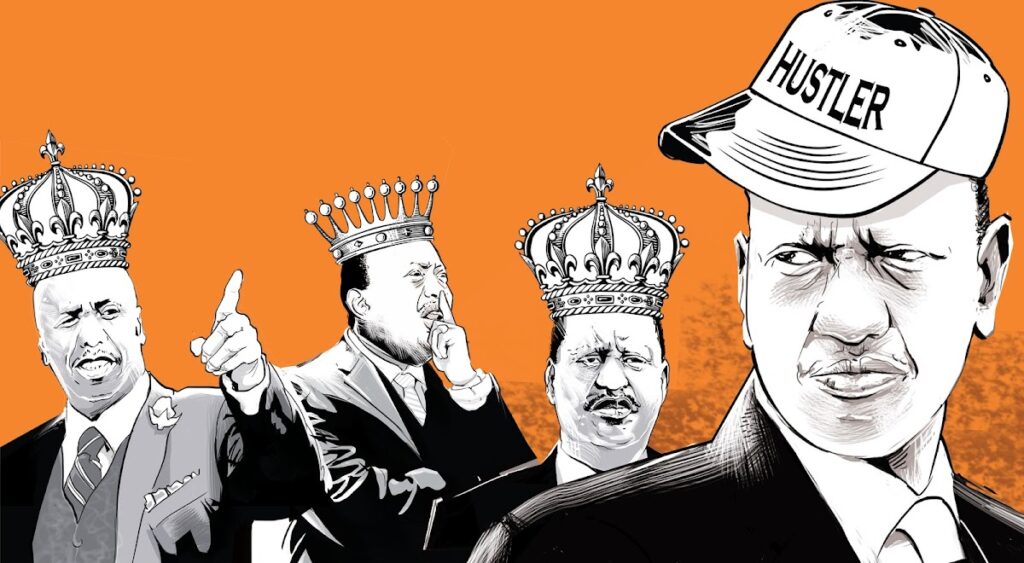
hustler president Ruto
Theatre of Absurd
With the current political shutdown and looming demonstrations led by Azimio Coalition, it is now crystal clear that dialogue needs to take centre stage between the two warring principals. All the political machinations are geared towards one man-the President, who unfortunately, is still taking unwavering stand against his perennial nemesis-Mr Odinga. Yet in fullness of time, as former US President Harry Truman said, ‘the buck stops with the President.” He has sole responsibility to unite everyone on board his ship as the captain. He has no option but to rise above political egocentricism and strongmanship.
The president’s responsibility is even greater and heavier than his opponent, Raila Odinga. As the push-and pull continues, the species at the bottom of the pyramid-the hustlers are feeling the maximum
heat. This has turned out to be the irony of Kenya’s politics since 1963. In the riveting spectacle of Kenya’s 2022 Presidential election, the Kenya Kwanza Coalition emerged as the commanding political orchestra, beating a drum of hope for many Kenyans, predominantly the ‘hustlers.’ Yet, the escalating political theatrics present a compelling reiteration of George Orwell’s timeless wisdom: ‘All animals are equal, but some animals are more equal than others.’
The Kenya Kwanza Coalition, under the flag of President William Ruto the ‘hustler’, sketched a compelling image of societal transformation, an ambitious vision aimed to tame the roaring beast of living costs. Though shrouded in a cloud of controversy and legal storms, their victory was seen as a herald of brighter tomorrows. Yet, the unfolding saga has laid bare the paradox of political pledges, akin to mirages that seem tangible but dissipate upon closer examination.
The resounding clamour began when the president’s appointments to cabinet positions, predominantly politicians rather than the proclaimed ‘hustlers,’ echoed an unexpected shift towards favouritism. It felt like a sudden wind change, disrupting the anticipated course and stirring waves of uncertainty. Even more disturbing was the inclusion of figures with murky pasts, such as Aisha Jumwa, whose murder charges evaporated in a puzzling turn of events, adding another layer of complexity to the political labyrinth.
However, these ripples of discontent pale compared to the public’s consternation triggered by the recently assented Financial Bill. Although some benevolent provisions were introduced, such as the reduction in the housing levy to 1.5%, the Bill delivered a stinging blow with the escalation of fuel tax from 8% to 16%, set to commence on July 1, 2023.
This drastic move stokes the flames of living costs, ironically scorching the ‘hustlers’ whom the administration had pledged to shelter. The digital creators’ tax, along with the heightened betting and
insurance withholding tax, weave a tighter economic straitjacket, threatening to stifle creativity and impose unbearable burdens on the Kenyan populace. These administrative twists and legislative turns provoke a soul-searching reflection on democracy’s principles, bedrock values, and public trust in the electoral process. The irony is biting: the torchbearers of the common man’s cause seem to have veered off course, casting long shadows over their initial promise. But in the midst of this bleak panorama, rays of hope pierce through the darkness. The ‘hustlers’ can awaken from being mere chess pieces in a
political game to become influential players who demand transparency and good governance.
Civil society
The lifeblood of democratic participation, can play a decisive role in holding the reins of the administration, ensuring they honour their commitments. Channels like peaceful demonstrations, the power of social media, and lobbying tactics can amplify the ‘hustlers’ voices, creating a crescendo that compels the government to listen.
Meanwhile, the judiciary, the bulwark of justice, can assert its constitutional authority to rein in the excesses of the executive and legislative arms, ensuring their conformity with the rule of law. In this check-and-balance dance, the opposition’s role is of paramount importance. They should rise as guardians of multiparty democracy, counteracting any encroachment from the ruling party and preserving the delicate equilibrium necessary for democratic health.
Civic education is the bedrock upon which an informed and engaged citizenry is built. It equips the ‘hustlers’ with the intellectual arsenal to understand their rights, navigate the labyrinth of political mechanisms, and hold their leaders to account. This can be achieved through educational workshops, integrating relevant topics into school curricula, or leveraging the reach of social media campaigns.
In essence, the unfolding political drama in Kenya is a stress test for its democratic structures and the resilience of its people.
ALSO READ: Tapping Into Top Journalists
It underscores that democracy is not merely a system of governance but a way of life that demands constant vigilance, active participation, and unwavering commitment to fairness, accountability, and the rule of law. In this grand narrative, the ‘hustlers’ are not passive bystanders but the main characters who can shape their destinies and chart the course of their nation’s future. The Kenyan political landscape, shifting sands and labyrinthine twists invite a profound contemplation of democracy’s paradox. Amidst this intricate dance of power, the ‘hustlers’ plight provides a potent reminder that the pulse of democracy beats not just at the ballot box but in the active voice of the citizenry, the steadfastness of institutions, and the accountability of its leaders. The ongoing saga offers a lesson on the enigma of democracy and the transient nature of political promises. For how long the dancing will amuse or create fury around the holy shrine of the oracle of Amadioha, only time will tell. The reality in the theatre of absurd that hits Kenyans is the paradox of the suffering hustlers in the promised land as they wait for the mysterious God to save them!





